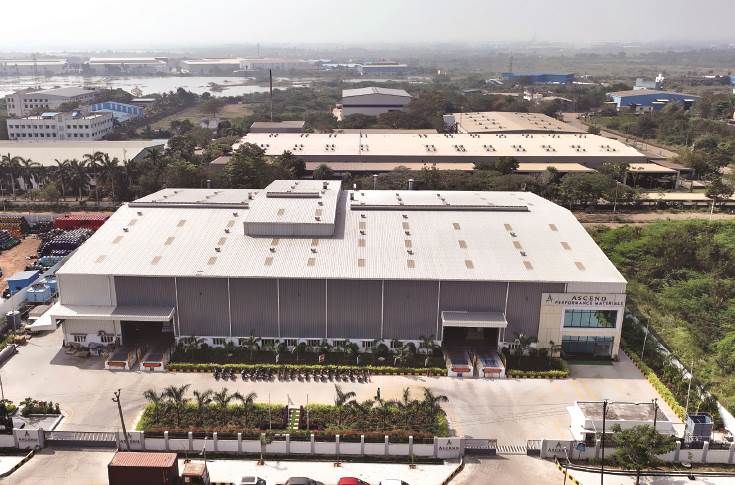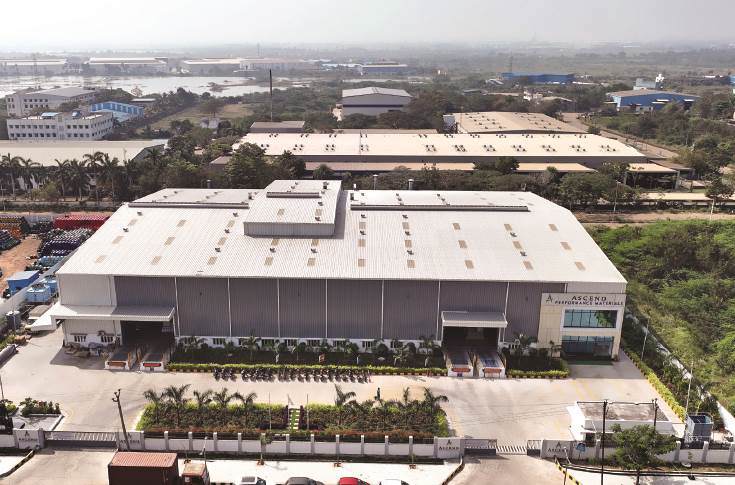Chennai-based Ascend Performance Materials is actively engaged with all major global OEMs and Tier I companies, many of whom are also operating in India. Over the past decade, the company has been a partner to market leaders in the EV segment where it helps them build battery modules, battery seals, wire harness retainers, connectors, suspension innovations, etc. For EV production, many OEMs are still dependent on imported assemblies for their functional parts and companies like Ascend can help them with faster localisation of key components. Ascend’s fully integrated production and global operations ensure the quality and consistency of material the automotive industry can rely on.
Autocar Professional spoke with Dharm Vahalia, Managing Director, South Asia, Ascend Performance Materials to understand a bit more about compounding and product development facilities that deliver localised solutions, especially for the EV industry.
The global electric vehicles engineering plastics market size is projected to surpass US$ 106.3 billion by 2030 with a CAGR of 26.85 percent from 2022 to 2030. What’s your assessment for India in terms of volumes and CAGR?
India is experiencing the same phenomenon we see happening around the globe with increased adoption of battery electric vehicles, albeit with some key differences from markets like China, the US and parts of Europe. In fact, we think of India as broadening the scope of e-mobility into more two-wheeler applications.
‘Our assets in India fit neatly with our other manufacturing assets globally, allowing us to bring new materials from Europe, China and America.’
The bottom line is that we see global growth in engineered materials dedicated to solving the unique challenges with e-mobility and India is a vital market for that growth. We estimate the Indian e-mobility market will grow astronomically over the next five years.
Since when have you been operating in India?
Ascend has been selling materials in India for over 10 years. And in May of last year, we acquired the engineered materials facility and the distribution and warehousing network of Formulated Polymers (FPL) to establish our local manufacturing footprint and significantly expand the customer base.
Our assets in India fit neatly with our other manufacturing assets globally, allowing us to bring new materials from Europe, China and the Americas to India; and provide our global, India-based customers the same materials wherever their production facilities are in the world.
What have your investments been in this country?
With the acquisition of the assets of FPL, we have been focused on improving the technology and equipment in Chennai, as well as our people’s health and wellbeing. We intend to make further investments to support our customers’ growth in the region.
Tell us about the R&D facilities in India, the type of work done here and what has been the investment for it?
Our R&D facility is co-located with our compounding plant in Chennai. Our technology organisation is at the forefront of new product development (leading local programmes as well as supporting global platforms). In addition, the team is engaged in localising global grades, driving growth through application development and providing technical support to our customers.
Are you looking at the India base for India only or will there be more than that?
We have invested in India firstly to significantly expand our service and portfolio options to our global customers operating in India. Secondly, we intend to establish robust network and capabilities to serve India-based OEMs and Tiers to participate in their growth locally as well as in their export markets. Finally, we expect to leverage local talent and capabilities to fuel Ascend’s global growth aspirations.
For the Indian automotive market what products or technology applications are you bringing to the table?
There are three major challenges that the EV segment is facing and trying to find realistic solutions which make it road worthy.
Safe power infrastructure: The system enables a five-minute escape time in case of a mishap and facilitates fast charging with increasing voltage requirements.
Our Starflam family products keep electricity flowing where it is intended.
Reliable thermal management: As parts need thousands of hours of heat and hydrolysis resistance along with increased complexity and ageing requirements. Ascend HiDura family products keep auxiliary heaters, coolant pumps, couplings and tubes operational in a demanding environment.
 Ascend’s R&D facility shares space with the compounding plant in Chennai.
Ascend’s R&D facility shares space with the compounding plant in Chennai.
Secure and comfortable ride: As with elimination of the ICE engine and its typical noise, one can hear significant noise from electric motors also. People driving EV’s are expecting a quieter ride and increased range through various innovations. Our Vydyne AVS technology products help reduce NVH and lessen noise and vibration without sacrificing safety.
India has emerged as the world’s third largest car market and there’s a big focus on EVs. Where does Ascend stand in this set-up?
As mentioned earlier, the growth rate of EV in India was beyond expectations and we foresee it is still going to surprise a lot of market experts. Ascend plans to utilise its global experience and expertise with EV players to realise technology transition not as the end of road, but as the start of a new road — one with many opportunities. We understand the speed and sequence of EV adoption as OEM’s are still dependent on imported assemblies for functional parts and Ascend can help them in faster localisation of key components.
Ascend understands propulsion technologies which drive change. The shift to EVs brings fundamental
changes to nearly all powertrain components and adds new EV technologies for the entire vehicle, including a battery pack, inverter, on-board chargers, and electric traction motors.
For example, in an EV, OEM spending on exhaust and fuel systems, transmissions and ICE engines will decline significantly, while spending on electric motors, inverters and battery packs will significantly increase. Axles and driveshaft components will see decline, while climate control and thermal management systems related components will rise.
There’s been a lot of talk about safety of EVs, especially in case of malfunctioning or overheating battery packs that have resulted in fires. Do you have thermal management solutions for battery makers that could meet the stringent safety properties?
Ascend Performance Materials has developed two materials for electric vehicles that improves passenger safety.
Starflam X-Protect is a flame-retardant nylon 6,6 designed to withstand EV battery thermal runaway. It is an industry-leading flame-retardant nylon 66 that withstands exposure to 1,100°C direct flame for 15 minutes, surpassing standard flame-retardant materials and aluminium tested in accordance with SAE AS5127 (a test originally designed for aerospace applications).
Thermal and noise management in EVs
- Specially curated polyamide solutions are being used in thermal management systems, especially powertrain (including EV batteries), interior, exterior, cable management, and miscellaneous electrical components.
- Products like Vydyne AVS tackles the issue of road noise and cabin comfort. It is specifically designed to provide structural support and vibration dampening without sacrificing on weight.
Ascend’s Trinohex Ultra electrolyte additive improves lithium-ion battery performance, safety and longevity. In third-party testing, Trinohex Ultra has demonstrated superior cathode protection across cathode and electrolyte chemistries. This protection leads to a 30 percent reduction in harmful gas generation that has been known to cause fires, especially in extreme conditions.
The Government of India is keen on localising components for EVs and reducing dependency on costly imports. Where is Ascend in that respect?
With the recent acquisition in Chennai, Ascend is able to manufacture engineered plastic compounds locally instead of having to import from the US. Also, we’re gradually localising many of the critical raw material inputs to improve our cost, lead times and reliability.
Tell us about the Nylon 66 / 6 applications in the automotive ecosystem that have been one of your bedrock products.
We are constantly developing new polyamide technologies to solve challenging engineering problems. We’re unique amongst PA66 suppliers to be serving all major end-use segments from engineered plastic components used in cars to carpet, and apparel. Specific to automotive, we have provided polyamide solutions in thermal management, powertrain (including EV batteries), interior, exterior, cable management, and miscellaneous electrical components.
We take pride in having a pulse of customer needs and emerging applications. In recent years, we’ve focused on e-mobility, providing solutions to enhance battery performance, enable digital connectivity and smart driving technologies, and improve the overall driving experience.
Recently, we have been awarded with HiDura business which has led to reduction of manpower effort by 50 percent at engine assembly lines and outperforms comparable PA46 grade in tensile strength retention after exposure to elevated temperature.
This interview was first published in Autocar Professional’s May 1, 2023 issue.
